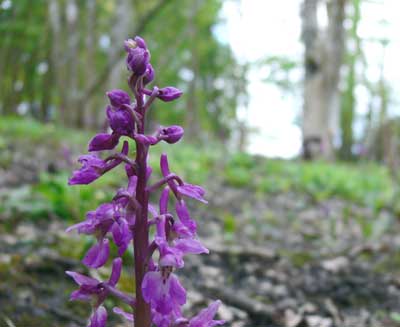Aren’t all orchids protected?
- Complaining about the Mainland - 17th August, 2024
- New island designation – is it just greenwash? - 26th April, 2024
- Police and Crime Commissioners – a solution or a problem? - 21st April, 2024
Round about now kettle-cases start popping up on the Isle of Wight. That’s the local name for early-purple orchids, which, as the name suggests, start flowering relatively early, in spring. If you live in England it won’t be long before it’s the same round your way, if it isn’t already.

Orchids are mysterious things, appearing apparently from nowhere, flowering spectacularly, and then disappearing sometimes for years. No wonder they have a certain mystique. A perennial question, almost an urban myth, concerns the protected status of orchids. Are orchids protected? Actually, no, not necessarily. There are some rare orchids, and yes, they get protected; but there are a lot of others, and certainly most of the orchids we enjoy seeing on roadside verges and the like have no greater protection than dandelions.
That’s because many orchids are not actually very rare, just hard to find because of their habit of flowering briefly, and of disappearing for seasons and then reappearing seemingly at random.
But it’s not true to say that orchids are not protected at all, because all wild plants are protected when growing in the wild to a very limited extent. Under the Wildlife and Countryside Act 1981 section 13 1(b) all wild flowers are protected from uprooting (although not picking or cutting, and not when it’s an incidental result of an otherwise lawful operation, which covers a lot of things). Additionally, some plants, which do include some orchids, have further protection under section 13 1(a) against picking, uprooting and destruction.
Internationally, all orchids are indeed protected by the 1975 Convention on International Trade in Endangered Species of Wild Fauna and Flora (CITIES). So orchids need a permit before they are traded across borders, but that’s nothing really to do with stopping them from being picked or mown down.
So we should leave the orchids for others to enjoy, but not out of a fear of incarceration, but just because it’s the right thing to do.


Pingback: ¿Es rara la orquídea Marsh? - Gardenun
Hello I have just found 4 bee orchis on my lawn I will mow around them are they rare I live in bedworth warwicksire
They’re moderately rare, yes, and lovely things. What a nice thing to find on your lawn.
I live near a field that has a magnificent annual display of wild orchids. Although its illegal to pick wild flowers, this apparently does not extend to developers, who have planning permission to build on this site. Its OK for them to come in with bull dozers and obliterate the orchids. This is the case, even though it the field the Loch Lomond and Trossachs National Park.
The Ranger responds: this is true. It is illegal to pick all wild flowers (on private land) without the landowners consent. But if the plant is not protected; and if you own the land, or the landowner doesn’t mind and has said so, then you can. This is also the case in national parks.
Hi, i am a regular dog walker at a local common land. However imagine my utter horror to find men, machines, and 4 wheeled drive vehicles driving over the top of the beloved wild Orchids on the beautiful, ONCE wild, ONCE unspoilt commonland.
It seems that it has been decided that this area is to be fenced to enable Dartmoor ponies to be released to graze, as some kind of land management plan.
Is this REALLY a good idea?
I would be interested to hear the veiws of others on this issue.
Many Thanks